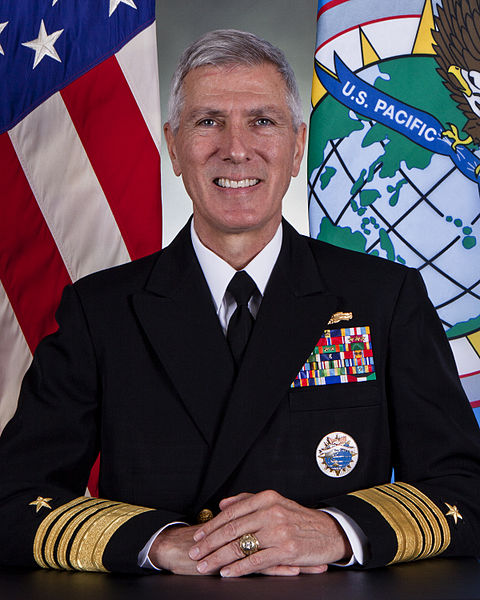 |
| Adm. Samuel J. Locklear III (Image: Wiki) |
By Donna Miles
American Forces Press Service
WASHINGTON, March 5, 2013 – Sequestration and budget uncertainties are already impacting U.S. Pacific Command’s operations and loom “like an avalanche” that could ultimately undermine the U.S. rebalance to Asia-Pacific in accordance with the new U.S. strategic guidance, the top commander in the region told Congress today.
Navy Adm. Samuel J. Locklear III told the House Armed Services Committee unpredictability in the budget process has “limited our flexibility to manage and have the potential to undermine our strategic rebalance momentum, as our ability to operate and maintain our force is at increased risk.”
Locklear emphasized that Pacom will continue to work with the services to preserve the homeland defense and crisis-response capabilities within forward deployed forces.
But the impact, he said, extends across the command’s mission areas: its ability to provide credible deterrence; to provide assurance to seven treaty allies in the region; and to support its ongoing efforts to ensure the security environment remains stable.
Locklear shared concern about the near-term impact on the services’ readiness accounts, reducing the availability of ready aircraft, ships and carriers and other assets that he called vital to Pacom’s reach across its sweeping area of responsibility that covers 52 percent of the globe.
He noted, for example, that a ship that was scheduled to deploy on March 1 was still on station at Pearl Harbor, Hawaii, because of reduced operating dollars that impact everything from flying hours to fighter rotations to carrier presence.
Sequestration could also trigger cuts in Pacom’s exercise program, a cornerstone of the command’s efforts to increase capacity and promote multilateral collaboration across the region, he said.
The Pacom mission requires the staff to engage actively across 35 nations, but with a 50 percent cut on the command travel budget that’s already taken effect, it’s significantly impacted these efforts.
“We’re 50 percent effective today because we had to cut that,” Locklear told the House panel. “That’s a small thing, but it gives you an indication of the kind of near-term impacts.
“The long term … is going to be like an avalanche,” he continued.
“And pulling those dollars out will ultimately result in less capacity … for my [area of responsibility],” Locklear added. “It also will ultimately, if allowed to, undermine the rebalance,” a strategy he emphasized is vital for the future.
He noted in his written statement examples of what looms ahead for Pacom as service funding is cut, including a dramatic decrease in training tempo and fewer rotational forces in the theater. This will lead to “decreased ability to accomplish assigned missions, respond to crises and support theater engagement objectives,” he warned.
“These funding cuts will challenge our ability to execute both discreet operations and the broader Indo-Asia-Pacific rebalance strategy,” he said.
Locklear noted during his testimony progress made over the past year to begin putting that strategy in place, recognizing that it won’t happen overnight but, over the long term, will set conditions that impact future generations.
“We have to get it right in the Asia Pacific,” he said. “The road we’re on will undermine that.”
Asked about pending civilian furloughs slated to begin next month, Locklear said they will have a “somewhat tragic” effect on 38,000 Defense Department civil service employees in region, many of them based in Hawaii.
These employees are vital to Pacom’s mission, Locklear told the committee. “I think, over time, in a low volunteer force, the line between our civil servants who serve in our Defense Department and our military have blurred to some degree,” he said. “And we rely very, very heavily on these civil servants to do the types of things that you might historically have considered as core military.”
A 20 percent reduction in pay -- expected to begin taking effect in late April -- will be devastating to many who already shoulder particularly high living costs, he said.
But the furloughs will have a trickle-down effect across the command, Locklear told the panel, reducing manpower within the Department of Defense Education Activity schools and overseas hospital system made up predominantly of civilian employees.
“That means that one-fifth of the teachers won't be teaching on any given day in those schools which are already probably pressurized to be as efficient as possible,” he said. “Our hospital systems overseas are mostly government employees, so we're going to have a decrease in the hospital care immediately.
“I could just keep going on, but that's the tip of the iceberg,” he said.
